Politics
Caribbean islands battered as Hurricane Erin reaches catastrophic Category 5
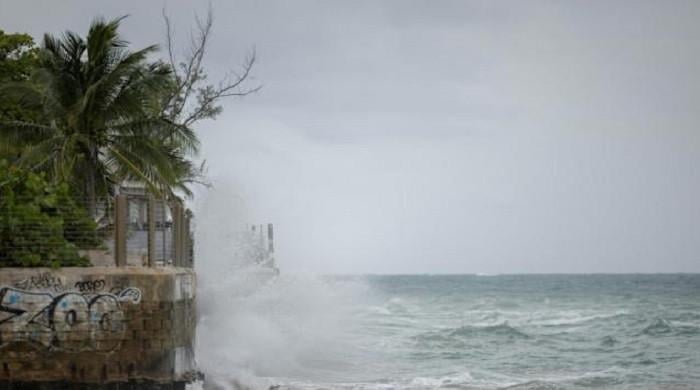
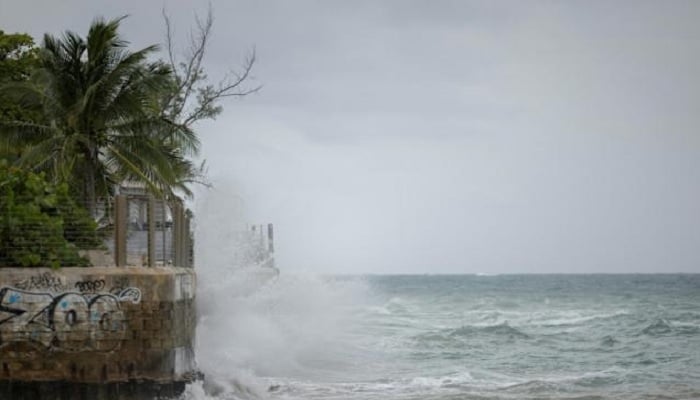
- Erin jumps from Category 1 to 5 in just over a day.
- Storm centre located 135 miles northwest of Anguilla.
- Lashes Caribbean with rain and winds, no landfall expected.
Hurricane Erin rapidly strengthened offshore to a “catastrophic” Category 5 storm on Saturday, as rain lashed Caribbean islands and weather officials warned of possible flash floods and landslides.
The first hurricane of what is expected to be a particularly intense Atlantic season, Erin is expected to drench Caribbean islands with rain and strong winds but not make landfall.
The US National Hurricane Centre (NHC) said in its latest report that the storm’s maximum sustained winds had increased to 160 miles (255 kilometres) per hour.
It was located about 135 miles (215 kilometres) northwest of Anguilla in the northern Leeward Islands, an area that includes the US and British Virgin Islands.
A flash flood warning was issued for Saint Thomas and Saint John in the US Virgin Islands as outer rain bands from Erin swept across, according to the US National Weather Service.
Tropical storm watches were in effect for St Martin, St Barthelemy, Sint Maarten and the Turks and Caicos Islands.
“Erin is now a catastrophic Category 5 hurricane,” the NHC announced earlier Saturday, denoting highly dangerous storms with sustained wind speeds above 157 mph.
The storm reached the highest level on the Saffir-Simpson scale just over 24 hours after becoming a Category 1 hurricane, a rapid intensification that scientists say has become more common due to global warming.
The hurricane’s centre is expected to move over the weekend just north of the northern Leeward Islands, the Virgin Islands and Puerto Rico.
It is then forecast to pass east of the Turks and Caicos Islands and the southeastern Bahamas on Sunday night before weakening.
The storm could drench the islands with as much as six inches (15 centimetres) of rain in isolated areas, the NHC said.
“Continued rapid strengthening is expected today, followed by fluctuations in intensity through the weekend,” the agency said in an earlier report.
It also warned of “locally considerable flash and urban flooding, along with landslides or mudslides.”
Climate hazard
Swells generated by Erin will affect portions of the northern Leeward Islands, Virgin Islands, Puerto Rico, Hispaniola and the Turks and Caicos Islands through the weekend.
Those swells will spread to the Bahamas, Bermuda and the US East Coast early next week, creating “life-threatening surf and rip currents,” the NHC said.
The hurricane is expected to turn northwest on Saturday night, then turn northward early next week. It is expected to weaken from Monday.
While meteorologists have expressed confidence that Erin will remain well off the US coastline, they said the storm could still cause dangerous waves and erosion in places such as North Carolina.
The Atlantic hurricane season, which runs from June until late November, is expected to be more intense than normal, US meteorologists predict.
Several powerful storms wreaked havoc in the region last year, including Hurricane Helene, which killed more than 200 people in the southeastern United States.
The National Oceanic and Atmospheric Administration — which operates the NHC — has been subject to budget cuts and layoffs as part of US President Donald Trump’s plans to greatly reduce the size of the federal bureaucracy, leading to fears of lapses in storm forecasting.
Human-driven climate change — namely, rising sea temperatures caused by the burning of fossil fuels — has increased both the possibility of the development of more intense storms and their more rapid intensification, scientists say.
Politics
Tehran warns of regional conflict if US attacks Iran
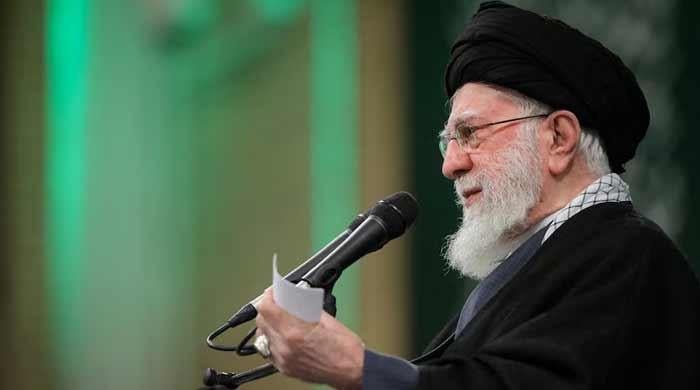
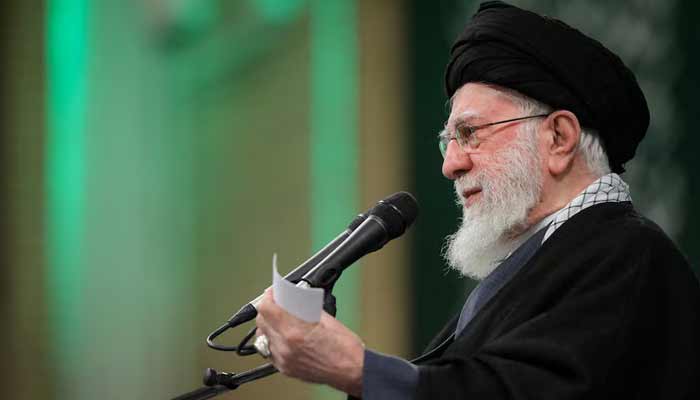
Iran’s Supreme Leader Ayatollah Ali Khamenei said that if the US attacked Iran, it would become a regional conflict, state media reported on Sunday, amid heightened tensions between Washington and Tehran.
The US has built up its naval presence in the Middle East after President Donald Trump repeatedly threatened Iran with intervention if it did not agree to a nuclear deal or failed to stop killing protesters.
“[Trump] regularly says that he brought ships […] The Iranian nation shall not be scared by these things, the Iranian people will not be stirred by these threats,” Khamenei said.
“We are not the initiators and do not want to attack any country, but the Iranian nation will strike a strong blow against anyone who attacks and harasses them.”
A diplomatic solution remains on the cards, with Tehran saying it is ready for “fair” negotiations that do not seek to curtail its defensive capabilities.
The US Navy currently has six destroyers, one aircraft carrier, and three littoral combat ships in the region.
The protests, which started in late December over economic hardships but morphed into the most acute political challenge to the Islamic Republic since its establishment in 1979, have now abated after repression.
Official numbers put the unrest-related death toll at 3,117, while the US-based HRANA rights group said on Sunday it had so far verified the death of 6,713 people. Reuters was unable to independently verify the numbers.
Khamenei likened the protests to a “coup”, saying that the goal of the “sedition” was to attack the centres that govern the country, state media reported.
Politics
Sheikh Zayed Grand Mosque sets visitor record in 2025


ABU DHABI: The United Arab Emirates’ (UAE) Sheikh Zayed Grand Mosque recorded a historic surge in visitors in 2025, welcoming nearly seven million worshippers and tourists, the highest annual figure since the landmark opened.
According to official figures, the total marked a 4% increase compared with 2024, reflecting the mosque’s growing status as one of the Middle East’s leading religious and cultural destinations.
More than 1.53 million people performed prayers at the mosque during the year, while over 2.4 million visitors attended for iftar and religious activities.

Foreign visitors accounted for 82% of the total, while UAE residents made up 18%. By region, Asia ranked first with 49% of visitors, followed by Europe at 33% and North America at 11%.
During Ramadan and Eid ul Fitr, more than 1.89 million worshippers and guests visited the mosque, where over 2.6 million iftar and suhoor meals were distributed as part of humanitarian initiatives.
The Sheikh Zayed Grand Mosque Centre also organised more than 4,000 cultural tours and programmes and hosted 335 high-level delegations throughout the year, reinforcing its role as a global hub for faith, tourism and intercultural dialogue.
Politics
Snowstorm disrupts travel in southern US as blast of icy weather widens


WASHINGTON: Travel misery was set to continue Sunday as a powerful snowstorm blasted southern US states, bringing subzero temperatures to regions not accustomed to the deadly winter conditions.
The latest bout of extreme weather came about a week after a monster storm pummeled a wide swath of the United States, killing more than 100 people and leaving many communities struggling to dig out from snow and ice.
Heavy snow fell in North Carolina and neighbouring states Saturday, as authorities urged residents to stay off the roads and warned oceanfront structures were threatened by the storm.
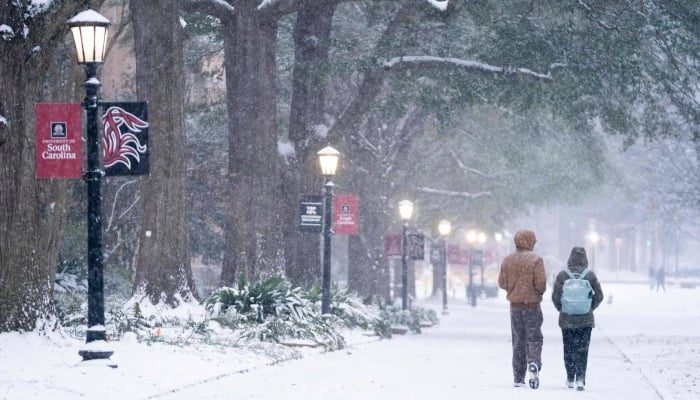
All of North and South Carolina, and portions of Georgia, eastern Tennessee and Kentucky, as well as southern Virginia were under a winter storm warning.
North Carolina saw 750 car crashes on Saturday, the highway patrol said.
Faust, North Carolina recorded 14.5 inches (37 cm) of snow, while West Critz, Virginia got 12.5 inches. Harrisburg, Tennessee received more than nine inches of accumulation.
In the North Carolina town of Cape Carteret, high winds sent thick snow blowing sideways, prompting the National Weather Service to warn that travel was “Treacherous and Potentially Life-Threatening especially if you become stranded.”
In dramatic footage released by police in Gastonia, North Carolina, a train ploughed at high speed into a semi-truck that had gotten stuck on the tracks, crushing the vehicle. No one was hurt.
The weekend storm forced more than 1,800 flight cancellations Saturday and Sunday at Charlotte Douglas International Airport in North Carolina, a major hub for American Airlines, data from the tracker FlightAware showed.
A 300-strong “snow team” was working to clear runways, taxiways, roads and sidewalks, the airport said Saturday.
More than 600 flights were cancelled Saturday at Atlanta’s international airport, the world’s busiest. About 50 flights in and out of Atlanta were cancelled in the early hours of Sunday.
“An explosively deepening coastal cyclone will continue to bring moderate to heavy snow, high winds, and possibly blizzard conditions for the Carolinas,” the National Weather Service said Saturday.
“An intense surge of arctic air behind the coastal storm will send below freezing temperatures down toward South Florida by Sunday morning.”
Davis, West Virginia recorded the lowest temperature in the lower 48 states on Saturday — a frigid minus 28°F (minus 33°C).
About 156,000 customers remained without power early Sunday, mostly in the south, according to poweroutage.us, with Mississippi, Tennessee and Louisiana hardest hit.
In North Carolina, the National Park Service announced the closure of campgrounds and some beaches at the Outer Banks, a series of barrier islands off the coast of the southern state that are vulnerable to storms.
It said oceanfront structures were threatened, and a section of highway that threads through its dunes was closed.
In Mississippi, Governor Tate Reeves said the US Army Corps of Engineers helped to install generators at critical sites, and authorities were opening 79 shelters and warming centres across the state.
The freezing weather forced Nasa to postpone a key fueling test over the weekend of the 322-foot (98-metre) rocket that is on the Cape Canaveral launch pad in Florida.
That in turn is likely to push back by at least a couple of days a planned manned Moon flyby slated for this month.
-

 Sports5 days ago
Sports5 days agoPSL 11: Local players’ category renewals unveiled ahead of auction
-

 Tech1 week ago
Tech1 week agoThis Mega Snowstorm Will Be a Test for the US Supply Chain
-

 Entertainment5 days ago
Entertainment5 days agoClaire Danes reveals how she reacted to pregnancy at 44
-

 Tech1 week ago
Tech1 week ago‘Uncanny Valley’: Donald Trump’s Davos Drama, AI Midterms, and ChatGPT’s Last Resort
-

 Fashion1 week ago
Fashion1 week agoSpain’s apparel imports up 7.10% in Jan-Oct as sourcing realigns
-

 Tech1 week ago
Tech1 week agoICE Asks Companies About ‘Ad Tech and Big Data’ Tools It Could Use in Investigations
-

 Sports5 days ago
Sports5 days agoCollege football’s top 100 games of the 2025 season
-

 Fashion1 week ago
Fashion1 week agoTurkiye cuts benchmark rate to 37%, flags confidence on inflation






